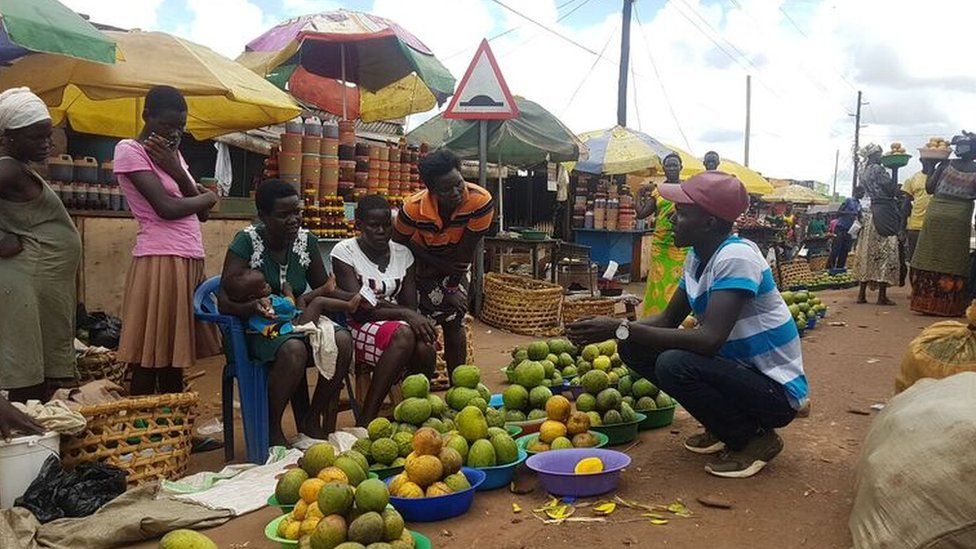The student trying to solve the food waste crisis
- Published

Lawrence Okettayot is on a road trip across Uganda.
He's spreading the word about a device he's created which could be a solution to Africa's food waste crisis.
Food wasted every year in the continent could feed up to 300 million people, according to the United Nations. In just Uganda alone, up to 40% of fruit and vegetables end up being discarded.
But Lawrence, a 23-year old engineering student, hopes that his invention, the Sparky Dryer, will change everything.
The device is a dehydrator running on garden waste that dries fruit and vegetables quickly, making them last for months instead of days.
It looks like a small fridge and uses organic waste instead of electricity - to which few farmers in Uganda and elsewhere in Africa have regular access.
Rotting food
"Much of what's sold in markets is wasted because farmers cannot store the food. So they have to return home and pick fresh fruit and vegetables to sell the next day.
"During the dry season very little grows here so people go hungry," says Lawrence, while walking in the buzzing market in the northern regional capital of Kitgum, past small stalls and piles of rotting food.
The starting price is $80 (£60). And each unit can dehydrate 10kg of mangoes in just two hours.
It has a small chamber where a gas fire is fixed, heating up a separate drying chamber above where the sliced produce is stacked in shelves.
It also has a catalytic converter which prevents harmful gases from being released during the drying process.
The alternatives to the Sparky Dryer are electric-powered dehydrators but they are too expensive, while traditional drying methods - solar dryers or open sun drying - do not work well during the rainy season and are much slower.
Yet despite its potential, Lawrence has sold very few units - seven in all. So does his invention actually work?
Three hours away by road from Kitgum, lives Joe Okettayot, Lawrence's uncle, one of the few farmers who has brought a dryer.
The BBC's Innovators series reveals innovative solutions to major challenges across Africa
Learn more about BBC Innovators.
Lawrence was inspired to come up with his idea after his uncle told him he was considering leaving farming.
"We used to throw away most of what we grew," says Joe.
"Now we can dry mangoes and other fruit even when it rains, so we don't waste anything anymore.
"We sell dehydrated products during the dry season for four times more money than the fresh produce," Joe adds while pointing to a brick building sitting in the middle of the farm which he built thanks to this extra income.
Uganda's government admits it has a massive food waste problem, but has not yet found solutions.
"We only have two processing facilities in Uganda," says James Tumwine from the Ministry of Agriculture.
"The government doesn't do business and private investors just aren't aware of the huge market potential here," he says.
Uganda plans to create food processing hubs for specific products in different regions, but progress is too slow.
Back in Kitgum, Lawrence is optimistic about the future and he wants to scale up his invention to reach parts of the world.
This BBC series was produced with funding from Bill & Melinda Gates Foundation
- Published31 July 2018